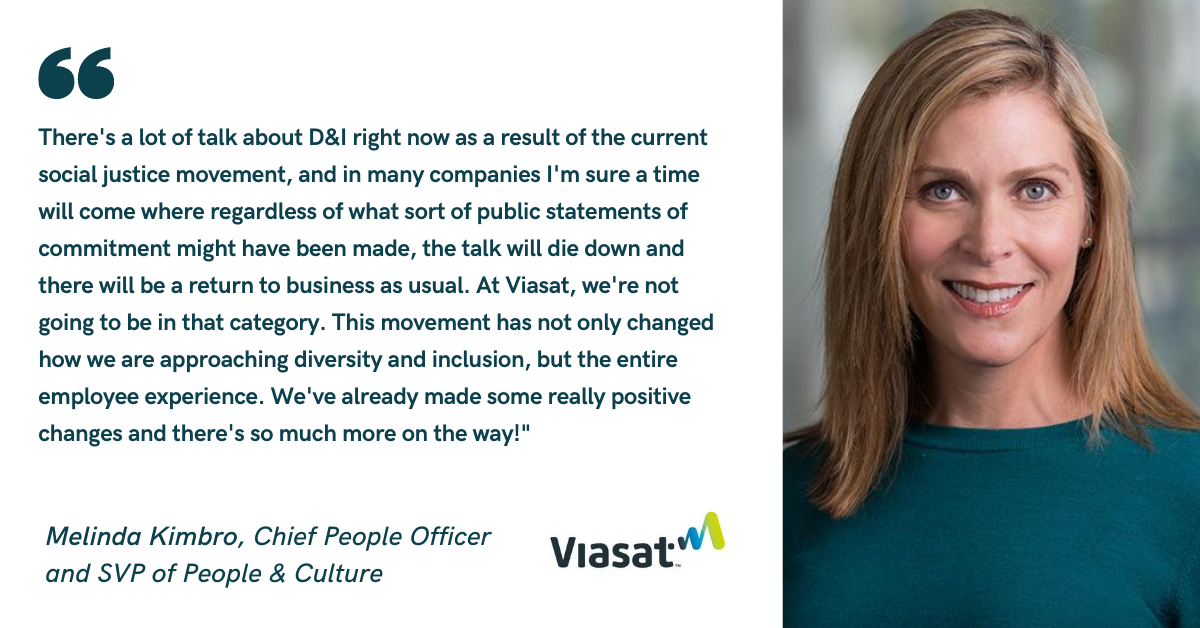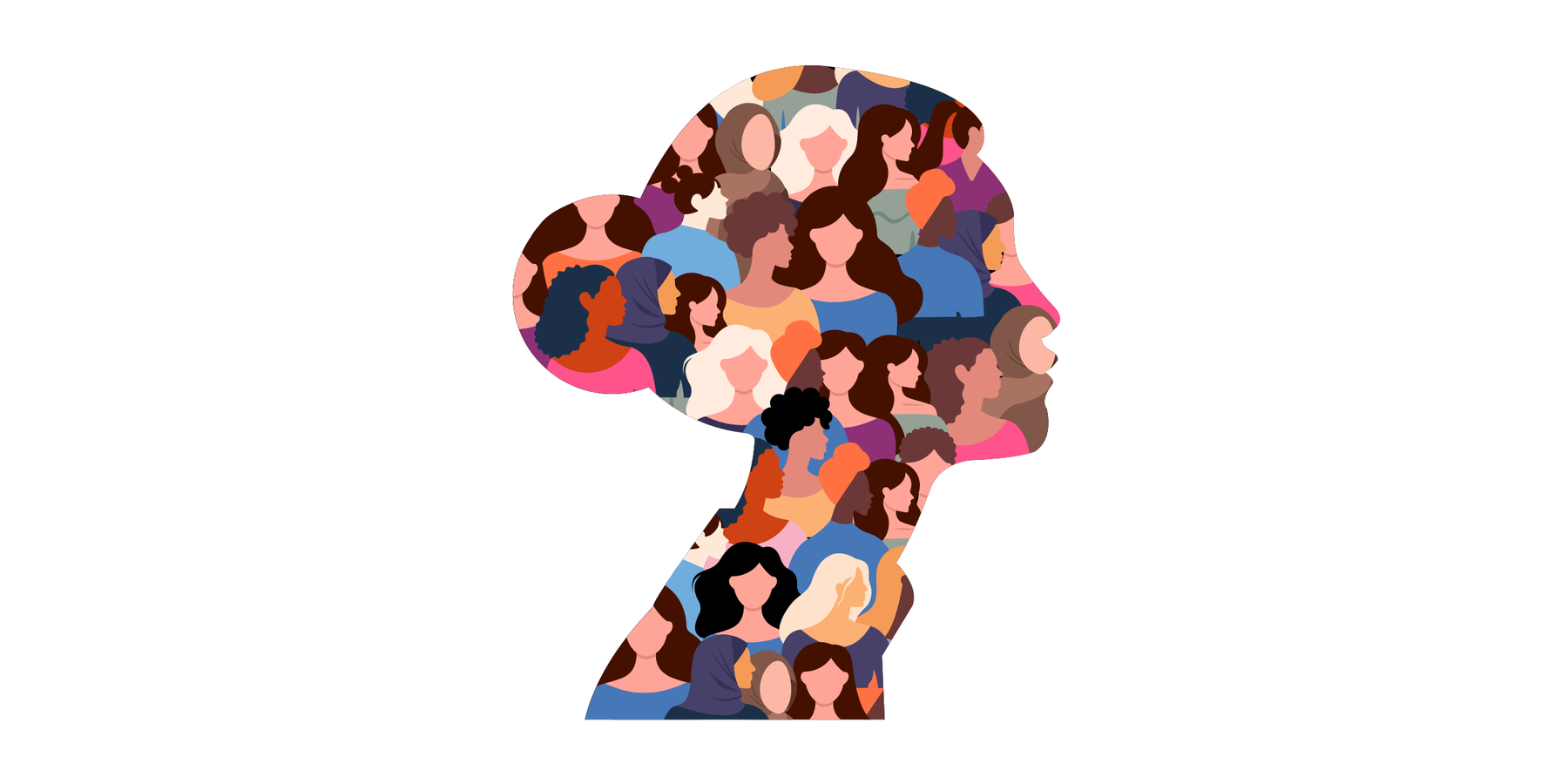Melinda Kimbro is no longer colorblind and now celebrates diversity through a new lens.
As the Chief People Officer and SVP of People & Culture at global communications and satellite internet company Viasat, a company she's been at for nearly 20 years, Kimbro is responsible for shaping, with the rest of the leadership team, Viasat's approach to diversity and inclusion at work.
That approach used to follow a common refrain in corporate America: "We don't see color."
"Our demographics have remained pretty consistent over the years and I believe that stems from a philosophy of, 'We don't care if you're black or white, a man or a woman, we just want the best talent," says Melinda. "But we've had to come to terms with the fact that striving to be color or gender blind isn't the right goal in the first place, and the numbers confirm it. We haven't moved the needle as much as we would have liked. Now it's time to set the concrete goals that will result in the long-term vision we want for our company and our leadership team."
Viasat's reevaluation of their commitment to D&I started before the most recent wave of Black Lives Matter protests swept the country, and the current climate has only reinforced how important it is for Viasat and all companies to create workplaces where everyone—and particularly historically disadvantaged groups like Black workers—can succeed.
We sat down with Melinda to discuss why she joined Viasat nearly two decades ago (and why she's never wanted to leave!), and how the very values that attracted her to the company have allowed Viasat to respond to the double crises of COVID-19 and racism in a way that centers their customers and employees.
How Viasat's values help them evolve and respond to change
When she was in college, Melinda became a debater by chance. "I had every intention of being an art major," she says, "but ended up falling in love with debate after taking an introduction to argument class. "The process of challenging ideas and coming up with arguments to support your position was right up my alley. At that point there was just no turning back, so I switched my major to communication. And these days art, specifically photography, is a hobby I love."
When she interviewed at Viasat a few years later, she was immediately struck with how similar the company's culture felt to the environment on the debate team. "There was this sense of defiance I picked up from the very first interview and a feeling that this was a company that didn't feel pressured to do things the same way every other company did. That really appealed to me. They thought critically about things, what they were doing, and why. They weren't just going through the motions" she remembers. "Early on I was told, 'It doesn't matter what your job title is. It doesn't matter how long you've been here. Everybody has the opportunity to influence. It's the ideas that matter.'"
That willingness to hear different perspectives —whatever they might be—"struck a chord with the debater" in Melinda, she says. She joined Viasat's HR team and her career grew from there.
Over the years, Melinda and her team have worked to create the best possible environment for Viasat's employees, and she's especially proud of the company's focus on employee engagement as part of that process. Viasat conducts a formal employee engagement survey every 18-months and pulse surveys on key topics in between. While there wasn't always widespread support for conducting these surveys, the leadership team has come to find just how valuable this insight is in understanding what's working for employees and what's not. Melinda says this is a great example of Viasat's value of "explore and evolve" and "the opportunities employees have to influence the shape of the company."
"As a company, we're not wired to do or design the same thing, the same way, for 10 to 20 years, she says. "In contrast, we sort of live by the motto 'always a better way' so we're constantly exploring new ways of doing things, whether that's a product, service, or how we approach the organization - our people and our culture," she says.
That value and focus on constant improvement, along with a parallel value of tolerating ambiguity, allowed Viasat to respond quickly when the COVID-19 pandemic hit earlier this year.
"While everyone wanted answers, being candid and acknowledging that there were some things we did know and other things we didn't, was tolerated pretty well," says Melinda of the first few weeks of managing through the crisis. "If you're able to tolerate ambiguity, you preserve optionality. So we didn't rush to provide answers that didn't absolutely need to be answered at that moment." she says. "We tried to communicate very, very regularly, even to say that we didn't know what this was going to look like, but here's what we do know today."
That communication extended to everyone, including the summer interns who were planning to be on Viasat campuses around the world. Back in early April when the pandemic made that option look less viable, the Viasat University Recruiting team was providing regular status updates to interns and partnering with business leaders to assess how a particular intern project might work in a virtual environment. "Being able to quickly pivot and offer many internships virtually, enabled us to preserve a large portion of the intern program albeit in a new form," says Melinda.
Another Viasat value is that of "one team," or the idea of making decisions and setting priorities based on what's best for the team. That drove the rest of Viasat's pandemic response, including plans to offer the following:
- "Ask Me Anything" town hall meetings with company leaders, including Melinda, for employees to get their questions addressed directly
- Ultra-flexible work hours
- Work-from-home kits to enable productive, comfortable remote work
- Training on remote leadership for managers
- Telehealth offerings so employees can get mental and psychological healthcare from home
- Additional support for Viasat's employee research groups (ERGs) to help employees come together and feel part of a community
- Zoom happy hours and tea times where employees can connect "outside of work" and dogs, cats, kids and partners are all welcome to make cameo appearances
Viasat already offered generous healthcare, including sessions with licensed mental health providers or therapists, and unlimited sick time, so employees who are ill or taking care of ill family members don't have to worry about missing work. "We've always been a very flexible and compassionate organization. Whether it's a mental health day or it's a day to go have a dental procedure or help a family member, we get that our employees have lives and families and interests outside of work and sometimes even overlapping work. Our approach is, 'If you're sick, be sick, we want our employees to take the time they need'" says Melinda.
Creating actual change when it comes to diversity and inclusion at work
Melinda is seeing a change in how topics relating to diversity and inclusion are being talked about and explored. "In general, I think people define reality based on what they've personally experienced. So if you haven't ever experienced racism, sexism, or some other form of bias, up close, or on a regular basis, these aren't topics that seem as relevant or real as they are for those who have been living it, and for too long. Today, and within Viasat specifically, I'm seeing more interest in understanding the experiences of others, particularly people of color and women, and an openness to accepting that 'Even if that experience isn't the same as mine, it's real' so what does that mean for society, as well as our company? And what can we do to change that?"
"Being an engineering company, we have a strong bias towards data, which is really helpful in a time like this, because we have lots of it. And so the conversations that I've been having with other executives at Viasat are really around, 'What does the data tell us?'" says Melinda.
By looking at that data, Melinda and her team are starting to see what is working and what isn't. "We have data that shows us that what we've been doing in some areas really hasn't resulted in much change," she says. "So the bottom line is that it's time to take a different approach."
One of the new approaches they are exploring is a more targeted leadership development curriculum. Beyond considering the unique development needs of employees at different stages of their careers they are also looking to target specific offerings to women and people of color in order to grow a more diverse set of leaders internally. They're also changing the nomination process for some programs so that employees can self-nominate, and peers can nominate one another, as well as accepting nominations from senior leaders. This too should result in a more diverse set of employees having the opportunity to participate in these development programs. And they've added additional unconscious bias offerings, which they believe should be mandatory for hiring managers and interviewers.
And Viasat's executive team has doubled down on their focus on D&I, with a plan to hire a senior D&I leader who will sit on an executive steering committee and play a key role in helping to set and execute on D&I strategy at both the corporate and business area level. "D&I is not something that HR owns. As a leadership team we are all accountable for increasing the diversity on our teams and ensuring an inclusive climate where all employees can thrive. If we do this right we'll have D&I naturally integrated into all that we do and it will be part of what enables us to achieve our strategic business objectives" says Melinda.
"We would like to see more decision makers at all levels within Viasat be a reflection of our customer base, and the customers we serve are Black, they're white, they're Hispanic, they're members of the LGBTQ+ community, they're women, men, and they're veterans. They span the gamut," says Melinda. "There's a lot of talk about D&I right now as a result of the current social justice movement, and in many companies I'm sure a time will come where regardless of what sort of public statements of commitment might have been made, the talk will die down and there will be a return to business as usual. At Viasat, we're not going to be in that category. This movement has not only changed how we are approaching diversity and inclusion, but the entire employee experience. We've already made some really positive changes and there's so much more on the way!"
If you're interested in working with Melinda at Viasat, check out more about their company values and their own roles here.



